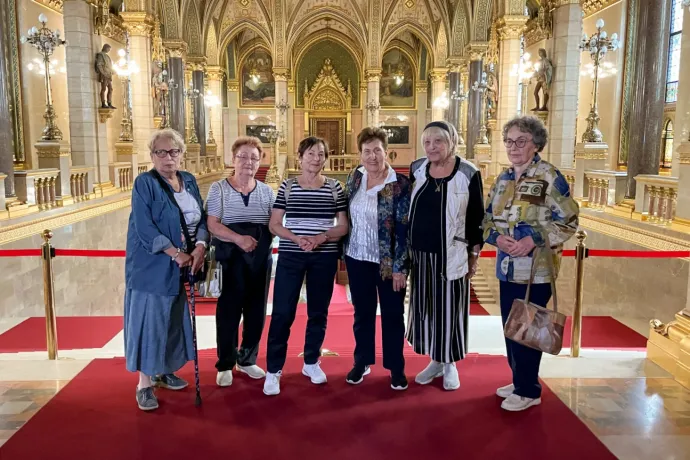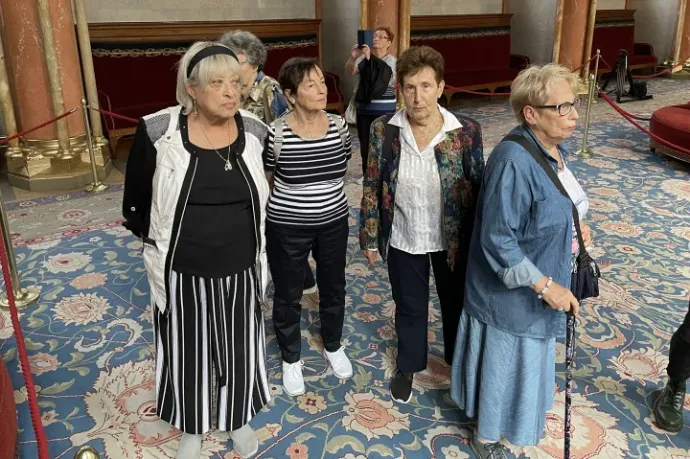
“We, along with several hundreds of thousands of others are being dishonored in this Hungarian Parliament. This is a desecration of all of us who lived through all that horror, and of all Hungarians who endured all the suffering of the 2nd World War. They are all being dishonored by those who dare put a bust of Horthy in this building. I also am a citizen who votes about who should represent us here, and I deeply resent this, on behalf of all of us” – 88-year old Olga Sólyom said, her voice breaking, as she stood on the maroon red carpet at the Parliament’s lounge.
Sólyom is one of six holocaust survivors who went to Parliament on Friday to peacefully protest against Horthy’s bust being unveiled by the far right party, Mi Hazánk in the office of Dóra Dúró, Deputy Speaker of the House. The party said that they were repaying an old debt by doing so, and the bust was even blessed by a reformed pastor.
The survivors meet annually as part of the initiative of the international non-profit organization Centropa, but this time they came after they were contacted by Lajos Oláh, MP of DK (Democratic Coalition). They met up because they felt it was their duty to speak up against the Horthy statue, and they simply do not understand how it is possible that such a statue could be erected in the Hungarian Parliament in 2022. They are not only angry with Dóra Dúró, but House Speaker László Kövér of Fidesz as well, as he said that the reason why he didn’t prohibit the unveiling of the statue was because it is up to Ms Dúró how she decorates her office.
Hearing Horthy’s name makes them indignant
The six survivors shared each their stories. Sólyom said: “Surviving the 2nd World War was extremely tough for me.
Seventy percent of my entire family was murdered, only my mother and I survived.”
She added that when they were forced out of their home,there were thirty of them living in a 25 square meter-apartment and were then sent to the ghetto at Klauzál square. In the end they managed to escape and were forced to spend the rest of the war hiding.
Although her mother was able to get their apartment back, “we had to live our lives without a husband and father, without a family” – she says.
83-year old Katalin Sommer was marched to the bank of the Danube along with her mother and brother. “Those at the beginning of the line were shot into the river. We only survived because someone notified Raoul Wallenberg (Swedish diplomat who saved and sheltered thousands of Hungarian Jews during the Holocaust), so he quickly came and thanks to him we were sent back to the house”. In the end, everyone from their building ended up in the ghetto. “I spent the last four months of the war there” – Katalin says. Her father was sent to a labour camp to build railway tracks. He was beaten to death by one of the guards. All of her other relatives were transported to Auschwitz, and none of them returned home. She says:
“I simply find it outrageous that today it is possible that the man who approved all these repugnant things can have a statue in the Hungarian National Assembly.”
82-year-old Zsuzsa Kádár was living in Nyíregyháza in 1944 when her father was taken to a labour camp, and the rest of her family was placed in the ghetto. From there, her mother and grandparents were sent to Auschwitz, and as soon as they arrived, her grandparents ended up in the gas chambers. Kádár was rescued from the ghetto by two women – complete strangers – and she spent the rest of the war in hiding. “Sixty-four of my family members were killed in the war” – she said.
86 year-old Zsuzsanna Jávor still remembers 5 April 1944 – this was the day she had to start wearing the yellow star. That day her parents sat her down and told her everything about the war and the situation the Jews were in. Although she was only eight, she says she feels that was the day when she became an adult.
Her father was sent to a labour camp, and fourteen of them were squeezed into an apartment in one of the houses allotted for Jews. She still remembers hearing Horthy give a speech on 15 October 1944 on the radio: he spoke about Hungary getting out of the war. But “the joy was short-lived”, as in the afternoon they announced that it was not going to happen after all and a curfew was introduced.
“If Horthy had gotten out the way the Romanians did, my father would have stayed alive”
-she said. Her father was later sent to Austria and her family perished in Auschwitz. “This is what Horthy did to Hungary and to Hungarian Jews. I simply couldn’t believe it when I first heard that they were unveiling a statue of him in parliament. It is unfathomable that there still are people – and an organization – in Hungary who worship this man”.
She is angry with House Speaker László Kövér for allowing the bust into the National Assembly. The parliament “belongs to all of us. To you, to me, to all Hungarians. This was a time in Hungarian history which should only be commemorated in a negative sense”. Responding to the argument that the bust is in Dúró’s office and not in a public area of the building, she said: “That is not her room, it is part of the parliament. I do not think she should be free to do whatever there – that is not what it is for”.
85-year-old Ágnes Simon had spent time in a children’s home and a ghetto. While both of her parents survived the war, all of her relatives from the countryside perished. “I often think that I got off easy, but I really didn’t”. She said that to this day she gets angry when she hears Horthy’s name.
“I am extremely angry now. First and foremost, I think Kövér should resign, and not Dóra Dúró.”
84-year-old Judit Nagy was a kindergartner when she first encountered antisemitism: referring to her at the playground, a woman told her child: “You shouldn’t play with that Jewish child”. She also ended up in one of the houses designated for Jews. Her grandfather was the first to die from the family, and her great-grandmother ended up in the Danube.
This is all Horthy’s fault, and the government’s”
– she said.

Mi Hazánk is not moved
The six survivors walked around parliament on Friday guided by Lajos Oláh of DK. The politician said that they wanted to show that what Horthy did "was Nazi collaboration, which cost the lives of hundreds of thousands of Hungarian Jews". He also said it was unacceptable that there is "talk of Horthy in the National Assembly nowadays, as he was both anti-national and anti-human".
As the Horthy statue is in the offices of Mi Hazánk, they could not see it – although they did not mind at all. They said they felt obliged to go inside the building. However, they do not expect a reaction from either the government or Mi Hazánk. One of them said of the latter that "Dóra Dúró would burn us like a book". In spite of it all, it felt good for them to have done this together.
We also asked Mi Hazánk about the protest, and their response was: "We do not know who the six people who protested in parliament about the Horthy statue were, nor do we know whether they belong to any party or are sympathizers of a particular party.
We do, however, know more than six people of Jewish origin who are grateful to Miklós Horthy. Of course, we will not remove the statue of Miklós Horthy from the Parliament."
For more quick, accurate and impartial news from and about Hungary, subscribe to the Telex English newsletter!
The translation of this article was made possible by our cooperation with the Heinrich Böll Foundation.